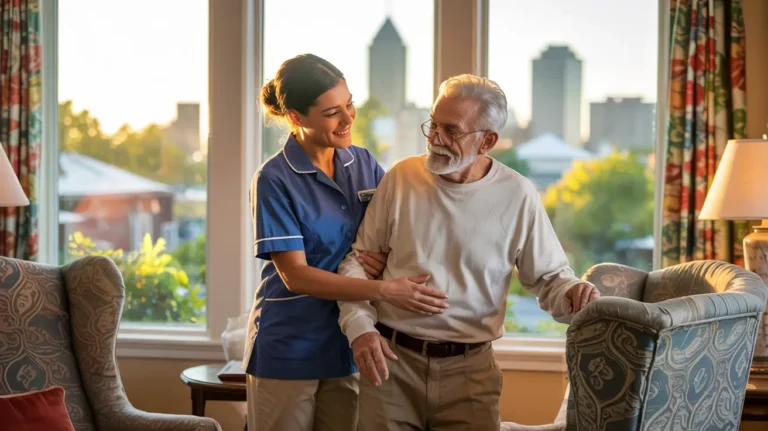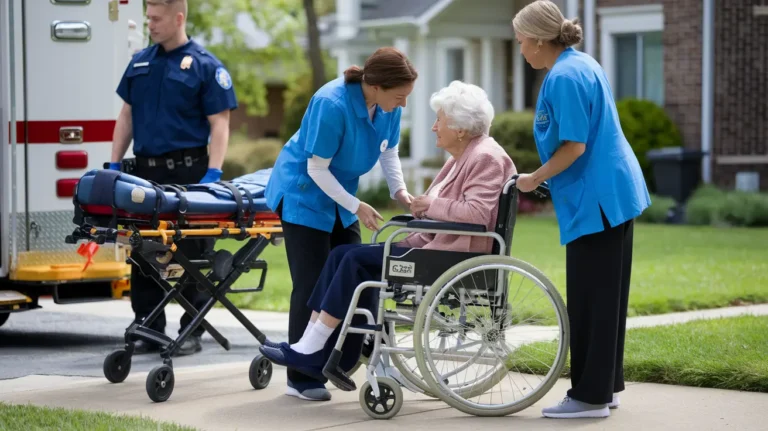A Complete Guide to Hiring Memory Care Support in Indianapolis: Finding the Right Care for Your Loved One
Did you know that over 6 million Americans are currently living with Alzheimer’s disease? And that number is only expected to rise! I still remember when my aunt was diagnosed with dementia a few years back. Our family was completely overwhelmed trying to figure out what to do next. Finding the right memory care support in Indianapolis became our top priority, but man, was it confusing at first!
I’ve spent years working with families going through this exact situation, and I’ve learned that knowing where to start makes all the difference. Whether you’re just beginning to notice concerning memory changes in your loved one or you’re already certain they need specialized care, this guide will walk you through everything you need to know about hiring memory care support in Indianapolis.
Trust me, you’re not alone in this journey, and with the right information, you can make confident decisions that’ll give your loved one the care they deserve while giving yourself some much-needed peace of mind.
Understanding Memory Care Support and When It’s Needed
Memory care support isn’t just your run-of-the-mill caregiving. It’s specialized care designed specifically for people with Alzheimer’s, dementia, or other memory disorders. I remember when I first started learning about memory care, I thought it was basically the same as regular home care. Boy, was I wrong!
Memory care providers have specialized training to handle the unique challenges that come with cognitive decline. They know how to redirect someone who’s becoming agitated, how to handle repetitive questions with patience, and how to keep your loved one safe when they might not always remember basic safety precautions.
You might be wondering if your loved one actually needs memory care support yet. Look, I missed the early signs with my own family member because I didn’t know what to watch for. If you’re noticing your loved one getting lost in familiar places, struggling with basic daily tasks they used to handle easily, or showing significant personality changes, it might be time to consider memory care.
The stages of memory care needs can vary wildly from person to person. In early stages, your loved one might just need some help remembering medications or appointments. But as things progress, they might need help with personal care, meal preparation, or round-the-clock supervision for safety reasons.
What really sets memory care apart from standard home care is the specialized approach. Standard caregivers are awesome, don’t get me wrong! But memory care specialists understand the cognitive challenges your loved one faces and have techniques to help them maintain dignity and as much independence as possible throughout the progression of their condition.
The benefits of getting professional memory care support are enormous – not just for your loved one, but for your entire family. I can’t tell you how many families I’ve seen who tried to do it all themselves and ended up exhausted and frustrated. Memory care professionals can provide consistent care based on best practices, giving your loved one the support they need while giving family members the chance to just be family again instead of full-time caregivers.
Types of Memory Care Support Available in Indianapolis
Indianapolis has quite a few options when it comes to memory care, and trust me, I’ve seen them all! Working through the choices can feel overwhelming at first, but understanding the different types will help you narrow down what might work best for your situation.
In-home memory care services are exactly what they sound like – professional caregivers come to your loved one’s home to provide specialized memory care. This option is fantastic for folks who might get disoriented or upset in new environments. I had a client whose mom would become extremely agitated whenever she left her house of 40 years, so in-home care was absolutely the right choice for them.
Memory care communities are specialized residential facilities where your loved one would live full-time. These places are specifically designed for people with memory issues – with secure environments to prevent wandering and staff trained in memory care techniques. The structured routines and social aspects can be really beneficial for some people with dementia.
Adult day care centers with memory support programs can be a lifesaver if you’re trying to balance caregiving with work or other responsibilities. Your loved one spends the day in a supervised, engaging environment and returns home in the evening. I’ve seen these work particularly well for people in earlier stages of memory loss who still benefit from socialization and stimulation.
Respite care is a short-term option that gives primary caregivers a much-needed break. Listen, caregiver burnout is real – I’ve experienced it myself! Taking a few days or even weeks to recharge can make you a better caregiver in the long run.
Here in Indianapolis, Brightness Home Care LLC offers specialized memory care services that can be tailored to your loved one’s specific needs. They’ve developed programs specifically designed for clients with various types of dementia and cognitive impairments. What I appreciate most about their approach is how they focus on maintaining your loved one’s dignity and independence while ensuring their safety and well-being. Their caregivers receive ongoing training in the latest memory care techniques, which makes a huge difference in the quality of care they provide.
Evaluating Memory Care Providers in Indianapolis
When I first started looking for memory care for my aunt, I had no idea what qualifications to look for! I nearly hired the first agency I called, which would’ve been a huge mistake. Let me save you some headaches by sharing what I’ve learned about evaluating providers.
First off, look for caregivers who have specific training in dementia care. Basic caregiver certification is a start, but specialized training makes a massive difference. Ask if the caregivers have completed programs like CARES Dementia Basics or if they’re Certified Dementia Practitioners. When I didn’t know to ask these questions, we ended up with a caregiver who got frustrated when my aunt would repeat the same questions – something that proper training would have prepared them for.
Staff-to-client ratios are super important too. For memory care, you want lower ratios than standard care because clients often need more attention and supervision. Don’t be afraid to ask agencies directly about this – if they’re vague or seem uncomfortable answering, that’s a red flag in my book.
Experience with specific conditions matters more than you might think. Alzheimer’s presents differently than vascular dementia or Lewy body dementia. When interviewing providers, ask about their experience with your loved one’s specific diagnosis. I remember being impressed when a caregiver from Brightness Home Care knew exactly how to handle my uncle’s sundowning symptoms because she had extensive experience with Alzheimer’s patients.
The importance of specialized memory care training can’t be overstated. It’s not just about patience (though that’s huge) – it’s about understanding the diseases that cause memory loss and knowing evidence-based approaches to care. Well-trained caregivers know how to reduce anxiety, prevent wandering, manage difficult behaviors, and create positive interactions even as cognitive abilities decline.
When evaluating agencies in Indianapolis, don’t just take their word for it – ask for examples of how their training has helped clients with situations similar to what your loved one is experiencing. The right provider will be able to share specific strategies they use, not just general reassurances about their quality of care.
Questions to Ask When Interviewing Memory Care Providers
I’ve interviewed dozens of memory care providers over the years, and let me tell you, asking the right questions upfront can save you so much heartache down the road! I once hired a caregiver without asking about their approach to redirecting negative behaviors, and it was a disaster when they couldn’t handle my dad’s occasional outbursts.
Start by asking about their care approach and philosophy. Do they use validation therapy, reality orientation, or reminiscence therapy? Each approach works differently depending on the person and their stage of dementia. A good provider should be able to explain their methods and why they might choose different approaches for different situations.
When it comes to staff training and experience, dig deeper than just “years of experience.” Ask how many clients with your loved one’s specific condition they’ve worked with. What ongoing training do they provide to their staff? How do they keep up with the latest research and techniques in memory care? Brightness Home Care has impressed me with their commitment to continuous education for their caregivers.
Safety protocol questions are non-negotiable. How do they handle wandering behaviors? What systems do they have in place for medication management? How do they assess the home environment for potential hazards? I learned this one the hard way when we discovered a caregiver was letting my uncle cook unsupervised, despite his history of leaving the stove on.
Communication policies vary widely between providers, and this can make or break your experience. How often will you receive updates? What’s their protocol for emergencies? How do they handle it if your loved one refuses care? The best providers have clear, established communication channels and don’t leave you wondering what’s happening.
Finally, don’t be shy about asking cost and payment questions. What’s included in their basic rate? What costs extra? Do they bill insurance directly? Do they help with long-term care insurance paperwork? Getting clarity on these issues upfront prevents surprise bills later on.
I’ve found that how providers answer these questions tells you as much as what they say. Do they seem rushed or annoyed by detailed questions? Do they give vague, generic answers or specific, thoughtful responses? The right provider will appreciate your thoroughness and match it with their own attention to detail.
Creating a Personalized Memory Care Plan
Let’s get real – no two people with dementia are exactly alike, so why would a one-size-fits-all care plan work? Creating a personalized plan is absolutely crucial, and it’s something I wish I’d understood sooner in my caregiving journey.
Assessing your loved one’s specific needs should be the first step. This goes beyond just checking boxes on a form – it should involve observing their daily routines, identifying triggers for anxiety or agitation, noting their strongest remaining abilities, and recognizing where they need the most support. When my mom first needed care, we focused too much on her memory issues and completely overlooked her mobility challenges, which led to a fall that could have been prevented.
Don’t try to create this plan in isolation! Involving family members in the process brings multiple perspectives and can reveal important insights. My sister noticed that our dad became much calmer when listening to his old jazz records – something I had completely missed because I always visited in the mornings when he rarely listened to music.
Incorporating familiar routines and preferences into the care plan makes a world of difference. I’ve seen clients who become agitated with bathing suddenly calm down when their caregiver incorporated elements of their lifelong routine – like using a specific brand of soap or bathing at their preferred time of day. These details might seem small, but they can dramatically improve quality of life.
Planning for progression of care needs is something many families overlook. Memory conditions generally worsen over time, so your care plan should include triggers for when to reassess and potentially increase support. Having these discussions early saves you from making rushed decisions during a crisis.
Working with providers to develop the plan should be collaborative. The best care happens when family knowledge about preferences and history combines with professional expertise about dementia care techniques. Brightness Home Care LLC excels at this collaborative approach, bringing together their professional insights with your family’s intimate knowledge of your loved one.
I’ve learned that the best care plans are living documents – they should be reviewed regularly and adjusted as needs change. What works today might not work in six months, and being flexible while maintaining consistency in the most important areas is key to successful memory care.
The Cost of Memory Care Support in Indianapolis
Oh boy, let’s talk money – I know it’s not the most comfortable topic, but it’s so important to understand what you’re getting into financially. When my family first started looking into memory care, the costs gave us serious sticker shock!
Average costs in the Indianapolis area can vary wildly depending on the type of care. From my experience, in-home memory care typically runs between $25-35 per hour, though rates can be higher for specialized care or overnight support. Memory care communities might charge anywhere from $5,000 to $8,000 monthly, depending on amenities and level of care needed.
Insurance coverage options are frustratingly limited for many families. Regular health insurance generally doesn’t cover long-term memory care, though it may cover medical components. Long-term care insurance can be a godsend if your loved one purchased a policy before their diagnosis, but these policies vary enormously in their coverage terms.
The Medicare/Medicaid situation often confuses families. Medicare typically doesn’t cover long-term memory care, though it may cover short-term skilled nursing care after a hospitalization. Medicaid might cover some memory care services, but eligibility is income-based, and not all providers accept it. I spent weeks untangling this for my family, and it was honestly a headache.
Veterans and their spouses should definitely look into VA benefits, which can include Aid and Attendance benefits that might help cover memory care costs. I’ve worked with several families who didn’t realize these benefits were available until months into paying out-of-pocket.
Indianapolis has some financial assistance programs worth exploring, including the Indiana Aged & Disabled Medicaid Waiver, which can help cover in-home care costs for eligible individuals. County-based assistance programs might also be available depending on your specific circumstances.
Brightness Home Care LLC offers several payment options and can help families navigate the complex financial landscape of memory care. They accept private pay, long-term care insurance, and certain Medicaid waiver programs. What I appreciate about their approach is their transparency about costs – they’ll give you a clear breakdown of expenses without hidden fees that suddenly appear on your bill.
My best advice? Start financial planning early, and don’t be afraid to ask for detailed explanations of all charges. The right care provider will understand your concerns and help you find the most cost-effective solution for your loved one’s needs.
Transitioning to Memory Care Support: Tips for Families
Transitioning to memory care can be emotionally challenging for everyone involved. I still remember how guilty I felt when we brought in our first caregiver for my mom, even though I knew we needed the help. The transition period is delicate, but there are ways to make it smoother.
Preparing your loved one for new caregivers takes patience and positive reinforcement. I’ve found that introducing caregivers as “friends” who are there to help rather than emphasizing that they need care can reduce resistance. Start with shorter visits to build familiarity before moving to longer care sessions if possible.
Creating a comfortable environment makes a huge difference. When we set up memory care for my father-in-law, we made sure his favorite chair, family photos, and beloved items were prominently placed in the areas where he’d receive care. The familiar surroundings helped him feel more at ease with the new routines.
Maintaining consistency during the transition is crucial for people with memory issues. Try to keep mealtimes, bedtimes, and other key routines as similar as possible to what they’re used to. I made the mistake of letting a caregiver completely rearrange my aunt’s morning routine, and it led to weeks of unnecessary confusion and anxiety.
Supporting the emotional needs of everyone involved means acknowledging that this is hard – for your loved one, for you, and for other family members. I found that joining a caregiver support group gave me a place to process my feelings without burdening my mom with my worries about her care.
Timeline expectations should be realistic. Some people adjust to new caregivers quickly, while others may take weeks or even months to fully accept the change. I’ve seen families give up too soon, not realizing that a rough start doesn’t mean the arrangement won’t work out with a little time and patience.
One strategy that worked well for us was maintaining some involvement in care even after bringing in professionals. This doesn’t mean micromanaging the caregivers, but rather finding ways to complement their work – perhaps by still handling Sunday dinners or morning coffee time together.
Remember that your loved one might have good days and bad days during this transition. Don’t judge the success of the arrangement based on a single difficult day. Give everyone time to adjust, and be open to making modifications to the care plan as you learn what works best.
How Brightness Home Care LLC Provides Specialized Memory Care in Indianapolis
I’ve had the opportunity to work closely with many care providers across Indianapolis, and Brightness Home Care LLC truly stands out when it comes to memory care services. Their approach goes beyond basic assistance to create truly personalized memory care plans.
Brightness Home Care’s memory care services cover everything from medication reminders and personal care assistance to specialized activities designed to stimulate cognition and provide meaningful engagement. They understand that memory care isn’t just about keeping someone safe – it’s about maintaining quality of life and dignity throughout the progression of memory disorders.
What really impresses me about their staff qualifications is their commitment to ongoing education. Every caregiver on their memory care team has completed specialized training in dementia care practices, and they regularly participate in continuing education to stay updated on the latest approaches. This isn’t just checking boxes on required training – they genuinely seek out the most effective techniques for working with memory disorders.
Their personalized approach to memory care begins with a thorough assessment of your loved one’s cognitive abilities, personal history, preferences, and specific challenges. I’ve seen how they take the time to learn about who someone was before their diagnosis – their career, hobbies, and important life events – and incorporate these elements into daily care. This biographical approach helps them connect with clients in meaningful ways even as memory fades.
The success stories I’ve witnessed with Brightness Home Care clients are truly heartening. One family I know was struggling with their father’s increasingly aggressive behavior during evening hours. Brightness Home Care identified specific triggers for his agitation and implemented a modified evening routine that dramatically reduced these episodes. Another client who had stopped speaking almost entirely began engaging verbally again after her caregiver discovered that music from the 1940s sparked memories and communication.
Located at 4911 West 38th Street in Indianapolis, Indiana 46254, Brightness Home Care LLC serves clients throughout the Indianapolis metropolitan area. Their central location allows them to respond quickly to client needs across the region. They’ve become a trusted resource for families dealing with Alzheimer’s, dementia, and other memory disorders throughout Indianapolis.
What truly sets them apart, in my experience, is their whole-family approach to care. They recognize that memory disorders affect not just the individual but the entire family system. Their team provides education and support for family members, helping them understand the changes their loved one is experiencing and teaching techniques for more positive interactions.
Finding Peace of Mind with the Right Memory Care Support
Finding the right memory care support for your loved one is one of the most important decisions you’ll make in your caregiving journey. I know firsthand how overwhelming it can feel to navigate all the options, evaluate providers, and manage the financial aspects while dealing with the emotional reality of a loved one’s cognitive decline.
Starting the process early gives you the greatest range of options and the time to make thoughtful, informed decisions rather than crisis-driven ones. I’ve seen too many families wait until they’re completely exhausted or until a dangerous situation occurs before seeking help. Trust me on this one – it’s never too early to start exploring your options.
As you consider your next steps, remember the key elements we’ve discussed: understanding the specialized nature of memory care, thoroughly evaluating potential providers, asking the right questions, creating a personalized care plan, preparing for the financial aspects, and managing the transition period with patience and compassion.
Brightness Home Care LLC is ready to partner with you on this journey, offering expert memory care services tailored to your loved one’s unique needs and circumstances. Their team understands the challenges you’re facing and has the training, experience, and compassion to provide exceptional care while giving you much-needed peace of mind.
I encourage you to reach out to Brightness Home Care LLC today at their Indianapolis office to schedule a consultation. Whether you’re just beginning to consider memory care options or you’re ready to implement a care plan immediately, their team can provide the guidance and support you need.
Have you already navigated the process of finding memory care support for a loved one? Your experiences might help others in similar situations. Or perhaps you have questions about your specific circumstances that weren’t addressed here? Either way, reaching out for professional guidance is a positive step toward ensuring your loved one receives the quality care they deserve.







